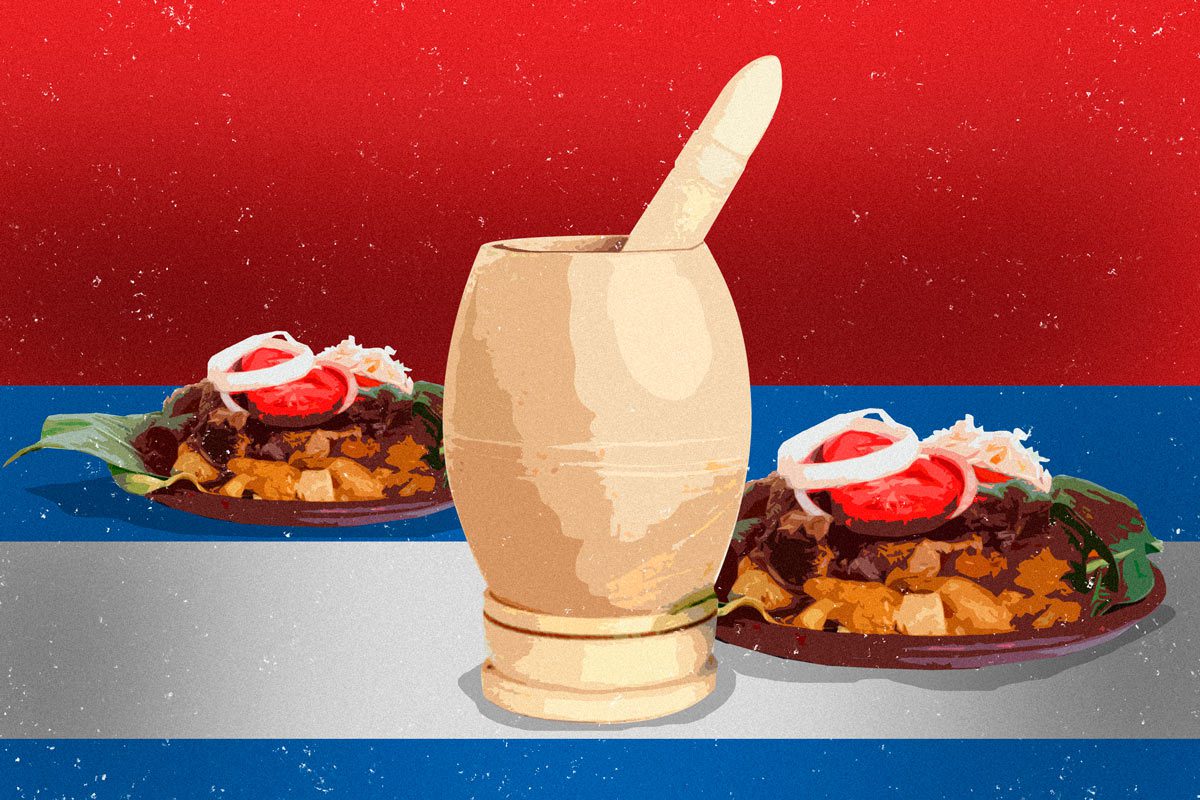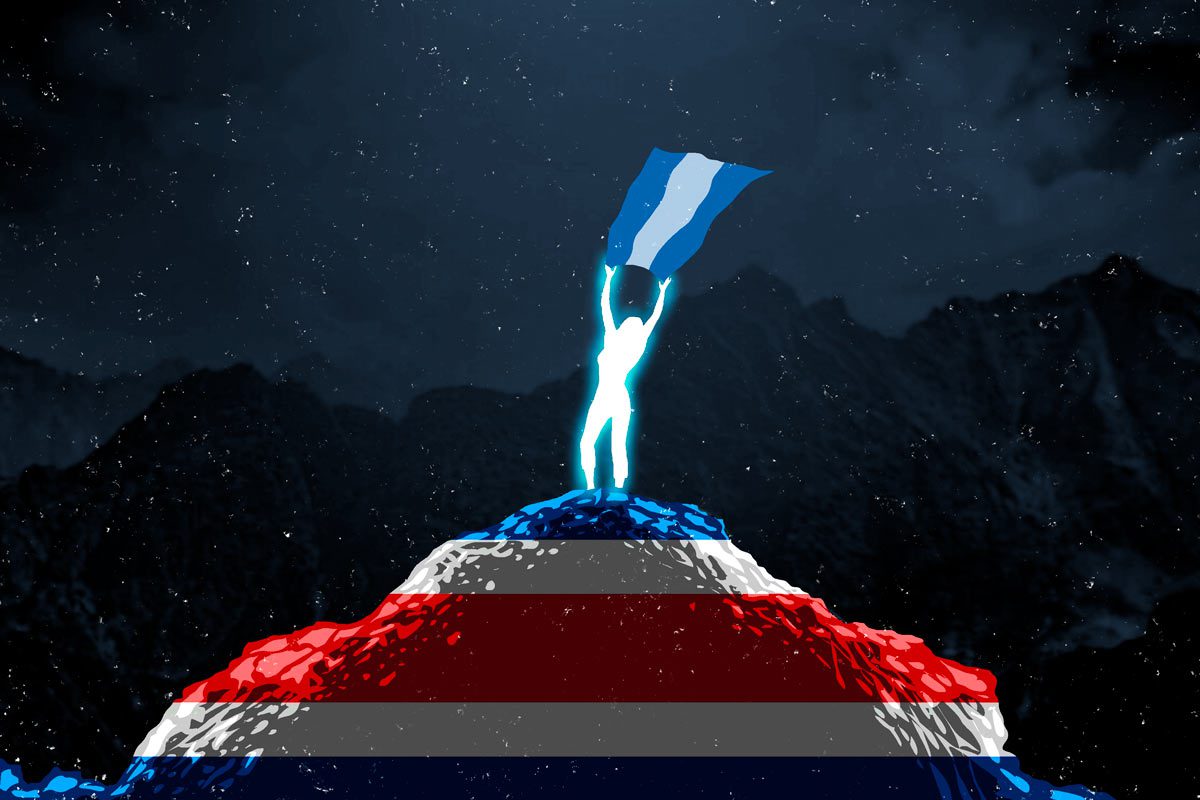These are the stories of three Nicaraguan exiles who fled the dictatorship of the Ortega-Murillo regime and who, in spite of everything, achieved their work and personal goals
“Las Concheñas” traveling the world

“That I should not come to the house anymore.” The Covid-19 pandemic turned the life of 42-year-old María René Velázquez upside down. She remembers well that afternoon in March 2020, when she was working as a domestic worker in San José, Costa Rica, where she had been exiled almost a year earlier, and her boss at the time told her not to come to the house anymore. The boss’s family was afraid that she might infect them with the virus by coming in and out of the house. María René returned home to San José with the uncertainty of not knowing what was going to happen to her life, that of her two children and her mother, Sofía Velázquez, 63, with whom she lived. But deep down she was also sure that she was not going to stay with her arms crossed.
María René is originally from the municipality of La Concepción, in the department of Masaya, Nicaragua, famous for its commitment to traditions and where a large part of the population is dedicated to handicrafts, agriculture or, more specifically, floriculture. This area is very characteristic for preserving culinary recipes that are passed down from generation to generation and encapsulate the essence of Nicaraguan flavor. María René knows them all because her grandmother taught them to her and her mother.
In the midst of the pandemic, María René and Sofía, mother and daughter, started cooking them and ended up selling traditional dishes. In the neighborhood, they were already known as “las concheñas” -the nickname given to people born in La Concepción-. They experimented and perfected everything they knew. That is how “Variedades Las Concheñas” was born.
Recibe nuestro boletín semanal
“We started making buñuelos, enchiladas, tacos, we did a little bit of everything. After three months I went back to work and we continued cooking on weekends, because it was always necessary to have an extra income,” says María René from San José, Costa Rica. Those months without a job taught her that she could not neglect that new income that was born in the midst of necessity. With both, she could provide for her family and afford to live in one of the most expensive capitals in Latin America.
She recalls that, by then, she had been in that new country for a year and through food she felt she was still connected to Nicaragua. María René fled Nicaragua with her entire family on July 18, 2018. By then, the regime of Daniel Ortega and Rosario Murillo had ordered “Operation Cleanup”, in the main protest centers of the country. María René’s entire family collaborated with the roadblock located in La Concepción (one of those barricades erected by the population throughout the country as a form of protest and precarious protection against the violent repression of the regime’s police and paramilitaries). Her uncles, who were doctors, also assisted the dozens of demonstrators injured by the dictatorship’s repression.
When repression against the population increased, María René’s family was persecuted, causing her to go into exile in Costa Rica, as part of the first wave fleeing government violence. “The first year we were here, I cried every day because I longed to return home. I wanted my neighborhood, I wanted my friends, I wanted my neighbors,” the woman recalls via telephone.
Five years later, this episode still affects them. Her voice cracks, but she immediately says that it hasn’t all been bad. “Variedades Las Concheñas” is a case in point. “Our products have traveled all over the world. They send us photos from Germany, Mexico, Guatemala, the United States… everywhere,” she adds. Success, for them, is in the flavor. A taste of home, of grandmother, of warmth. It is also in the use of traditional ingredients and the right doses. “We measure everything, we love to work with measurements”, she remarks proudly.
In addition to the dishes, they started selling cocoa and cereals in bags, ready to prepare. They went from making seven kilos a week to producing up to 45 or 50 kilos of dry products, that is, cocoa, barley, cereals and pinolillo, which they pack hermetically and send all over the world. These are now the star product.
“I can’t complain. Not everything has been bad, there have been many good things, we have met very good people who have been very supportive,” she says. Some of them have been other fellow entrepreneurs from the Red de Mujeres Pinoleras, an initiative based in San José that supports women entrepreneurs like María René to have technical and emotional tools to start their businesses. Within this collective there are other women who have sodas -small restaurants in Costa Rican slang- and cafés where they exhibit Las Concheñas’ products.
“Now we have the privilege that our products have evolved, they have better quality. Thanks to that they have traveled to other countries. Customers really like the presentation of the dry products and the flavor of the food we take to fairs and markets,” explains María René, who continues to work in the homes of Costa Rican families as a domestic helper.
However, the entrepreneur resents that her refugee process has taken too long. After five years of living in Costa Rica and generating her own income, her asylum application has not been approved. According to figures from the same authorities, from April 2018 to the end of 2022, Costa Rica has received 222,056 refugee applications, of which, the vast majority (172,689) are pending. The wait for many Nicaraguans in that country seems endless.
To graduate is ” to resist”

For young Nicaraguan exiles like José Morales, 25, finishing his degree is synonymous with success for the simple fact that in Nicaragua it is unthinkable. He knows this these days, when he reads the news about the closure of Universidad Centroamericana (UCA), one of the main private universities in the country, run by the Jesuits, which for more than 60 years educated dozens of generations of young people. The closing of UCA, which since August 18 has been renamed Casimiro Sotelo National University, is the dictatorship’s latest action against higher education. It is also against young university students who challenged the dictatorship and organized against the Sandinista regime.
Although José did not study there, but at University of Commercial Sciences (UCC), the closure impacts him and confirms what he knew when he went into exile in Costa Rica on July 18, 2018: being young and a student in Nicaragua means placing oneself in front of the dictatorship.
“It was a great joy when I received my degree in Advertising. I believe that every young person in Nicaragua has this challenge of finishing university, a dream that many have had taken away from them,” he assures through a phone call. In May 2019, already in Costa Rica, he resumed his studies at Latin American University of Science and Technology (Ulacit). He passed the exams and had ten classes validated. Although he only had one semester left before leaving Nicaragua, he had to start his academic process from scratch.
Now, José works in an advertising company in Costa Rica, the same company where he started at the end of 2022 as an intern. That year he finished his studies, so he remembers that moment of his graduation very well: “On the cap I put the phrase ‘we are the voice of the voiceless’, alluding to Bishop (Óscar Arnulfo) Romero, who also defended social justice. It was a way of dedicating that effort to all the young people who could not in Nicaragua,” he recalls.
Surviving in a new country

Snayder Suazo had everything that many young people in Nicaragua dreamed of: a newly bought car, a hamburger stand that was beginning to gain fame and a musical band called Huella Urbana that shone in the artistic scene of Chinandega, his hometown. At 25 years old, business was his thing. But all that changed on April 18, 2018, when he decided to join – like thousands – the larger protests against the Ortega and Murillo regime.
Together with the student movements, and despite being from Chinandega, he coordinated resistance actions at Central American University (UCA) -expropriated by the dictatorship last August 18. Some of these actions consisted of protests outside the campus. All this occurred at a time when the country’s universities were true bastions of student resistance. This led to his imprisonment on October 19, 2018. Prior to his arrest, his house was shot at by paramilitaries. He spent more than five long months in prison until he was released on April 6, 2019.
Afterwards, he continued to be involved in student movements, but in March 2020 he had to go into exile because the arrests against opponents and harassment by paramilitaries did not stop. “They issued an arrest warrant again and that’s when they were pasting the ballots with my face that said `Coup leader wanted’. They stuck them up there in Chinandega, in Managua,” he recalls.
“I came here (to San José) with nothing. I spent a month in a foster home, then I had to start working in a car wash, I have been a security guard, until one day some relatives who are in the United States lent me money to buy a sublimation machine, “he says via phone call.
Snayder started from scratch with that machine. Thanks to it, he has a business that, due to his immigration status as an asylum seeker, he has not been able to regularize. However, it has been his main source of income. “I make it in fabric and other products such as mugs, caps, personal items, scarves, phone protectors. So there is a specific market for that, which I plan to expand,” he notes enthusiastically.
He offers his products on Facebook’s Marketplace, a platform where thousands of ventures like his are offered. Ninety percent of his clients are Costa Rican. “After coming up empty-handed, building my brand again fills me with pride,” he says. Snayder does not want to end his business plan there, he wants to open a soda in the future where he can hire other people and generate profits through food. After all, his thing is the hamburgers that made many people in Chinandega lick their fingers.

